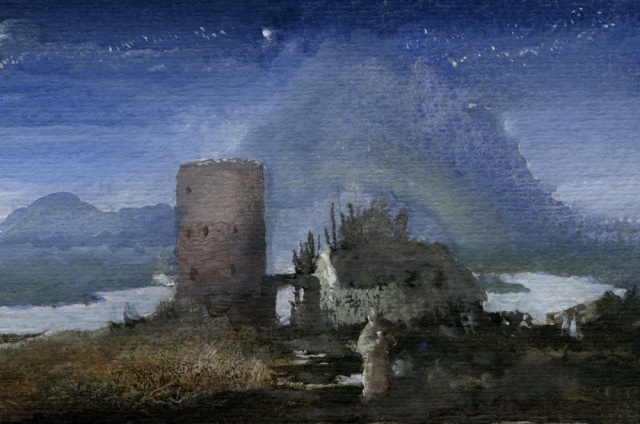I. EVENING
Slowly now the evening changes his garments
held for him by a rim of ancient trees;
you gaze: and the landscape divides and leaves you,
one sinking and one rising toward the sky.And you are left, to none belonging wholly,
not so dark as a silent house, nor quite
so surely pledged unto eternity
as that which grows to star and climbs the night.To you is left (unspeakably confused)
your life, gigantic, ripening, full of fears,
so that it, now hemmed in, now grasping all,
is changed in you by turns to stone and stars.translated by Edward Snow
II. EVENING
The sky puts on the darkening blue coat
held for it by a row of ancient trees;
you watch: and the lands grow distant in your sight,
one journeying to heaven, one that falls;and leave you, not at home in either one,
not quite so still and dark as the darkened houses,
not calling to eternity with the passion of what becomes
a star each night, and rises;and leave you (inexpressibly to unravel)
your life, with its immensity and fear,
so that, now bounded, now immeasurable,
it is alternately stone in you and star.translated by Stephen Mitchell
“Evening” is one of the most famous poems by Rilke. It is also a poem that I have always regarded as unbelievably, sublimely beautiful, expressing how we humans are torn between the simultaneous boundedness and unboundedness of existence. Our substance consists both of the immense stars and of the perfect and silent stones. Our life, “gigantic, ripening, full of fears” is dramatically poised between the two. I am reminded of Jung’s Red Book and his beautiful vision in the desert:
“How beautiful it is here! The reddish color of the stones is wonderful; they reflect the glow of a hundred thousand past suns these small grains of sand have rolled in fabulous primordial oceans, over them swam primordial monsters with forms never beheld before. Where were you, man, in those days? On this warm sand lay your childish primordial animal ancestors, like children snuggling up to their mother. /o mother stone, I love you, I lie snuggled up against your warm body, /your late child. Blessed be you, ancient mother.”
Circle of Stones, Tenere Desert
I have been wondering about how a translation can make or break a poem. Stephen Mitchell’s translation of the poem by Rilke I am featuring today is the most celebrated but, frankly, I do not understand why. The translation I favor is by Edward Snow, who called Rilke “…the poet of thresholds and silences, of landscapes charged with remoteness and expectancy.” After a careful study of the poem in the original German I can say just this: while I was able to understand both Rilke’s original verse and Snow’s translation, if I had just been presented with Mitchell’s rendition, I would have been rather lost and confused. The emotional reaction I experience is also much more palpable when I read the Snow’s translation.
Yaroslav Gerzhedovich, “The Midnight Stars“

